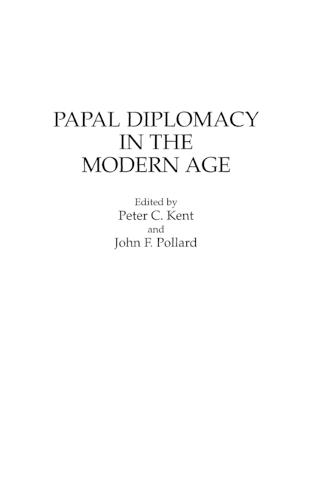Overview
This volume brings together some of the leading scholars of Vatican history to examine papal diplomacy in the 19th and 20th centuries. Essays consider the role of the Vatican in the major events of the modern era (the unification of Italy, World Wars I and II, the Holocaust, the war in Vietnam, the Nicaraguan revolution). Other essays examine the way in which the Papacy conducts its relations with secular states, specifically addressing its relationship with Ireland, Canada, the United States, and Yugoslavia. And three essays consider the place of the Vatican in the politics of the contemporary Middle East. This important work provides a sense of the complex nature of the Papacy's involvement in the political and diplomatic issues of the modern world.
Full Product Details
Author: Peter Kent ,
John Francis Pollard
Publisher: Bloomsbury Publishing Plc
Imprint: Praeger Publishers Inc
Dimensions:
Width: 15.60cm
, Height: 2.90cm
, Length: 23.50cm
Weight: 0.624kg
ISBN: 9780275944414
ISBN 10: 0275944417
Pages: 302
Publication Date: 20 June 1994
Recommended Age: From 7 to 17 years
Audience:
College/higher education
,
Professional and scholarly
,
Undergraduate
,
Postgraduate, Research & Scholarly
Format: Hardback
Publisher's Status: Active
Availability: Manufactured on demand

We will order this item for you from a manufactured on demand supplier.
Reviews
This book is not only interesting reading--it provides the details of an almost forgotten aspect of international relations forged by the only religiously oriented entity currently enjoying legal capacity as an international person. It provides a useful analysis of a State without a military arm, occupying a microscopic territory on a world map filled with powerful States, and at a time when many commentators fear that religious fundamentalism may be a potential replacement for conflicts suppressed during the Cold War. -American Society of International Law The book is a good introduction to the subject. -Perspectives on Political Science ?The book is a good introduction to the subject.??Perspectives on Political Science ?The book is a good introduction to the subject.?-Perspectives on Political Science ?This book is not only interesting reading--it provides the details of an almost forgotten aspect of international relations forged by the only religiously oriented entity currently enjoying legal capacity as an international person. It provides a useful analysis of a State without a military arm, occupying a microscopic territory on a world map filled with powerful States, and at a time when many commentators fear that religious fundamentalism may be a potential replacement for conflicts suppressed during the Cold War.?-American Society of International Law
?This book is not only interesting reading--it provides the details of an almost forgotten aspect of international relations forged by the only religiously oriented entity currently enjoying legal capacity as an international person. It provides a useful analysis of a State without a military arm, occupying a microscopic territory on a world map filled with powerful States, and at a time when many commentators fear that religious fundamentalism may be a potential replacement for conflicts suppressed during the Cold War.?-American Society of International Law
?The book is a good introduction to the subject.?-Perspectives on Political Science ?This book is not only interesting reading--it provides the details of an almost forgotten aspect of international relations forged by the only religiously oriented entity currently enjoying legal capacity as an international person. It provides a useful analysis of a ""State"" without a military arm, occupying a microscopic territory on a world map filled with powerful States, and at a time when many commentators fear that religious fundamentalism may be a potential replacement for conflicts suppressed during the Cold War.?-American Society of International Law ?The book is a good introduction to the subject.??Perspectives on Political Science ""The book is a good introduction to the subject.""-Perspectives on Political Science ""This book is not only interesting reading--it provides the details of an almost forgotten aspect of international relations forged by the only religiously oriented entity currently enjoying legal capacity as an international person. It provides a useful analysis of a ""State"" without a military arm, occupying a microscopic territory on a world map filled with powerful States, and at a time when many commentators fear that religious fundamentalism may be a potential replacement for conflicts suppressed during the Cold War.""-American Society of International Law
?The book is a good introduction to the subject.?-Perspectives on Political Science ?This book is not only interesting reading--it provides the details of an almost forgotten aspect of international relations forged by the only religiously oriented entity currently enjoying legal capacity as an international person. It provides a useful analysis of a State without a military arm, occupying a microscopic territory on a world map filled with powerful States, and at a time when many commentators fear that religious fundamentalism may be a potential replacement for conflicts suppressed during the Cold War.?-American Society of International Law ?The book is a good introduction to the subject.??Perspectives on Political Science The book is a good introduction to the subject. -Perspectives on Political Science This book is not only interesting reading--it provides the details of an almost forgotten aspect of international relations forged by the only religiously oriented entity currently enjoying legal capacity as an international person. It provides a useful analysis of a State without a military arm, occupying a microscopic territory on a world map filled with powerful States, and at a time when many commentators fear that religious fundamentalism may be a potential replacement for conflicts suppressed during the Cold War. -American Society of International Law
Author Information
PETER C. KENT is Professor of History and Dean of Arts at the University if New Brunswick in Canada. He is the author of The Pope and the Duce (1981). JOHN F. POLLARD is Professor and Department Head of History at Anglia Polytechnic University in England. He is the author of The Vatican and Italian Fascism, 1929-32 (1985).



